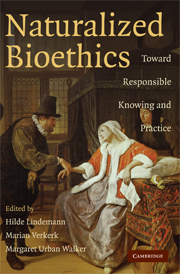Book contents
- Frontmatter
- Contents
- Contributors
- Acknowledgments
- Naturalized Bioethics
- Introduction: Groningen Naturalism in Bioethics
- I RESPONSIBLE KNOWING
- 1 Moral Bodies: Epistemologies of Embodiment
- 2 Choosing Surgical Birth: Desire and the Nature of Bioethical Advice
- 3 Holding on to Edmund: The Relational Work of Identity
- 4 Caring, Minimal Autonomy, and the Limits of Liberalism
- 5 Narrative, Complexity, and Context: Autonomy as an Epistemic Value
- 6 Toward a Naturalized Narrative Bioethics
- II RESPONSIBLE PRACTICE
- Bibliography
- Index
4 - Caring, Minimal Autonomy, and the Limits of Liberalism
The Relational Work of Identity
Published online by Cambridge University Press: 05 June 2012
- Frontmatter
- Contents
- Contributors
- Acknowledgments
- Naturalized Bioethics
- Introduction: Groningen Naturalism in Bioethics
- I RESPONSIBLE KNOWING
- 1 Moral Bodies: Epistemologies of Embodiment
- 2 Choosing Surgical Birth: Desire and the Nature of Bioethical Advice
- 3 Holding on to Edmund: The Relational Work of Identity
- 4 Caring, Minimal Autonomy, and the Limits of Liberalism
- 5 Narrative, Complexity, and Context: Autonomy as an Epistemic Value
- 6 Toward a Naturalized Narrative Bioethics
- II RESPONSIBLE PRACTICE
- Bibliography
- Index
Summary
Dr. Atul Gawande reports this history of a patient with extensive and untreatable cancer:
Lazaroff was only in his early sixties, a longtime city administrator … [with] the hardened manner of a man who had lost his wife … and learned to live alone. His condition deteriorated rapidly. In a matter of months, he lost more than fifty pounds. As the tumors in his abdomen grew, his belly, scrotum, and legs filled up with fluid. The pain and debility eventually made it impossible for him to keep working. His … son moved in to care for him. Lazaroff went on around-the-clock morphine to control his pain. His doctors told him that he might have only weeks to live. Lazaroff wasn't ready to hear it, though. He still talked about the day he'd go back to work.
Then he took several bad falls. … A metastasis was compressing his thoracic spinal cord. … His lower body was becoming paralyzed.
He had two options left. He could undergo spinal surgery. It wouldn't cure him – surgery or not, he had at the most a few months left – but it offered a last-ditch chance of halting the progression of spinal-cord damage and possibly restoring some strength to his legs and sphincters. The risks, however, were severe. [Surgeons would] have to go in through his chest and collapse his lung just to get at his spine. He'd face a long, difficult, and painful recovery. And given his frail condition, … his chances of surviving the procedure and getting back home were slim.[…]
- Type
- Chapter
- Information
- Naturalized BioethicsToward Responsible Knowing and Practice, pp. 80 - 105Publisher: Cambridge University PressPrint publication year: 2008
- 9
- Cited by

